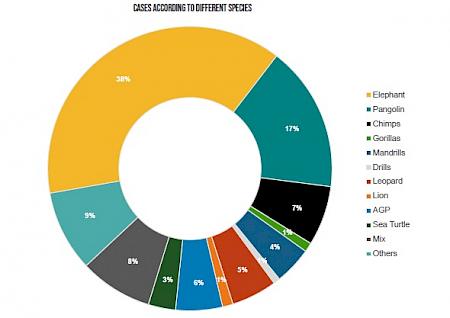Cameroon is in Africa’s top five countries for biodiversity yet is facing a devastating decline in species due to habitat loss, poaching, and illegal wildlife trade (IWT). The consequences of this decline go beyond ecological concerns, as they also impact the country’s economy, socio-cultural fabric, and wider conservation efforts.
Analysis of Wildlife Court Cases in Cameroon, January 2010 – December 2022 identifies weak levels of collaboration, poor record-keeping, and misinterpretations of the 1994 Wildlife Law that create legal loopholes. It also uncovered that 24% of cases had the alarming hallmarks of influence peddling and corruption within the legal process, including non-arrests of suspects, unreported cases, unnecessary delays, deliberate errors, and low court penalties.
Sone Nkoke, Senior Programme Officer and supervisor for the report, emphasised the importance of addressing these shortcomings, stating, “While the country’s 1994 Wildlife Law has many strengths, including its specialised powers over general laws, there is significant room for improvement to fortify investigations and prosecutions.”
Despite efforts by law enforcement and increasing interventions from the Ministry of Forestry and Wildlife (MINFOF), CITES1 Management Authorities and others, the analysis of seizures via TRAFFIC’s Wildlife Trade Information System (WiTIS) database revealed that Cameroon ranked seventh out of 29 African countries as an IWT origin or transit location between 2009 and 2019.
 In this period, the top-seized items included raw elephant tusks, worked ivory pieces, pangolin scales, African Grey Parrots (AGP), and a variety of primate species traded for purposes other than bushmeat. Fifty-five per cent of wildlife offences were for illegal possession, circulation, or trading, and a further six per cent had an additional use of arms offence.
In this period, the top-seized items included raw elephant tusks, worked ivory pieces, pangolin scales, African Grey Parrots (AGP), and a variety of primate species traded for purposes other than bushmeat. Fifty-five per cent of wildlife offences were for illegal possession, circulation, or trading, and a further six per cent had an additional use of arms offence.
Highlighting the gravity of the situation, Nkoke stressed the need for a holistic approach: “Improving investigations have the potential to unearth the involvement of wider criminal networks that may also pose threats to national security. To combat this illegal trade effectively, wildlife crime in Cameroon should not be considered a standalone offence. It should be approached holistically, making the connections with other crimes that involve weapons, finance, and cybercrimes.”
The report’s findings serve as a call to action for law enforcement agencies, government bodies, and conservation organisations to collaborate and strengthen efforts to combat illegal trade in wild species.
Recommendations
After successive accountingof Cameroon court cases, ranging over 12 years, the report suggests that the following areas need urgent attention:
Greater Co-operation and Collaboration
Establish overarching working groups or other Inter-Ministerial mechanisms to oversee the multiple agencies that directly or indirectly carry out law enforcement actions resulting in the seizures of wildlife specimens, arrests of suspects, and court cases. These must encompass relevant Ministries, Institutions and Services, including MINFOF, Justice, Customs, Police, and others.
Tackling corruption
Judgements should be swift to avoid court case management, such as corruption, conflict of interest, bribery, and favouritism, using the National Anti-Corruption Commission (NACC) and other legal instruments such as the Cameroon Penal Code.
Refine Legal Frameworks
The 1994 Wildlife Law and subsequent Decrees could be open to misinterpretation and consequent in poor court decisions: revisions to clarify regulations are needed, particularly Law No 94/01 of 20 January 1994, laying down forestry, wildlife, and fisheries regulations should also clearly spell out the roles and responsibilities of the different law enforcement entities.
Increase Capacity of Court Case Management
A better understanding of the legislative framework should be available to officials across law enforcement and court actors to conduct effective investigations and case management. In the short term, workshops may fill the gaps, but sustained programs such as specialised training modules must be included in the curricula of the different institutions.
In addition to these recommendations, Law enforcement and the judicial system should use professional standard reference tools, such as TRAFFIC’s Rapid Reference Guide for Cameroon.
Rapid Reference Guide for Cameroon
Addressing these gaps in the prosecution of wild species crime is crucial to safeguarding Cameroon’s natural heritage and protecting the livelihoods of local communities. TRAFFIC continues to work closely with agencies and has recently signed a Memorandum of Understanding with MINFOF to strengthen ties against the trade of wild species in Cameroon.
This post was originally published on this site be sure to check out more of their content.








